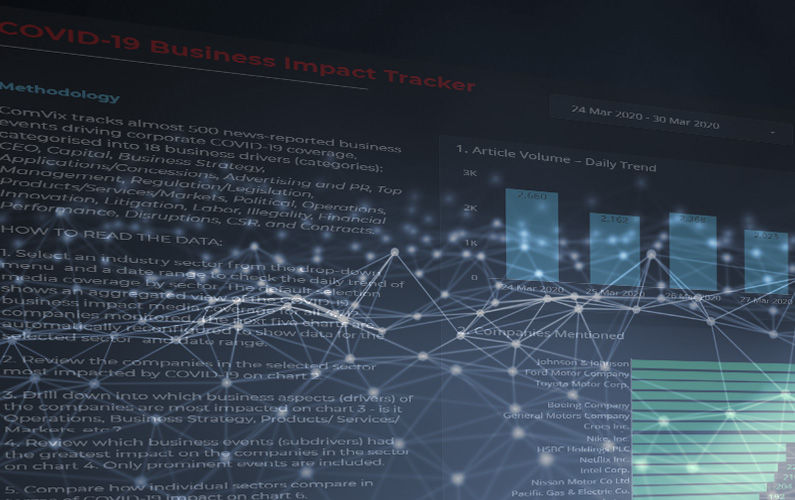Although telecommunications companies are feeling COVID-19’s economic hits, many commentators expect that the longer-term outlook for investment in the industry would be favourable, particularly in areas such as automation, virtualisation and cloud enablement – solutions whose value has been amplified by the pandemic.
We decided to use the Commetric COVID-19 Business Impact Tracker to analyse the effects of the COVID-19 crisis on the telecoms sector. Our free tool uses rule-based natural language processing (NLP) and machine learning to track more than 450 types of news-reported business events that affect companies and industries during the pandemic.
We analysed 134,161 articles from 7,721 online media outlets for the period 15 January – 11 May 2020, covering most publicly-traded companies in the US and the UK, and looked into the business drivers that gained the most traction in the media in the context of the COVID-19 pandemic.
Like many other industries such as Technology, Aerospace or Food and Drink, the most impactful business driver here was Financial performance, which featured articles primarily on financial forecasts and earnings announcements.
Most articles talked about missed sales expectations, but there was also a fair share of reports on rising revenues due to higher demand.
For example, Vodafone, the world’s second-largest mobile operator, said the crisis was causing data traffic on its networks to surge, with demand rising 50% in some markets, as most people switched to home working, driving up traffic.
Nokia also had a rise in revenue for the first three months of the year, backed by higher sales of 5G equipment, while Sierra Wireless met its expectations despite some pandemic-related supply chain disruptions.
However, as the pandemic hit top-line growth, the world’s largest telecommunications company, AT&T, reported relatively modest first-quarter 2020 results. The virus also took a bite out of BCE Inc.‘s revenue during that quarter.
Although the telecoms industry didn’t score highly in terms of CSR activities, lagging behind Financial Services, Fashion and Health, it was the CSR driver that made Verizon the most often mentioned company in our analysis:
Verizon made headlines for donating $2.5 million to small businesses through the nonprofit Local Initiatives Support Corp., bringing LISC’s Verizon Small Business Recovery Fund up to a potential $7.5 million. The donation was the top-trending story in the media debate around the telco industry as a whole.
The discussion around the company was additionally boosted by the Capital driver: Verizon bought the video conferencing platform BlueJeans, which has seen an uptick in usage amid lockdowns and working-from-home policies, alongside platforms like Zoom, Slack and Microsoft Teams.
The Capital driver was also influential in the newsflow around T-Mobile, which received “broad support from the banks” to close its merger with Sprint, the fourth-largest mobile network operator in the US before the $26 billion deal. T-Mobile CEO John Legere tied the merger to providing connectivity during the pandemic.
Telecom Italia was also in the news due to the Capital driver, as US activist hedge fund Elliott Management reduced its stake in the company to 6.97% from 9.72%. Reuters reported that a person familiar with the matter cited a “portfolio rebalancing” given the market situation.
But Telecom Italia was prominent also because of the CEO driver: its CEO Luigi Gubitosi was widely quoted for saying the company’s network can cope with the surge in traffic driven by the coronavirus crisis.
Gubitosi was also one of the most often quoted CEOs in the media discussion around the coronavirus across all industries.
The CEO driver was central for BT as well, since its CEO Philip Jansen tested positive for the coronavirus, making BT one of the first major companies to announce that its top executive had been hit by the disease.
In addition, Jansen announced he will donate his salary to health workers for at least six months and won’t make any job cuts related to the coronavirus crisis, which resulted in news coverage within the CSR and Labour drivers respectively.

